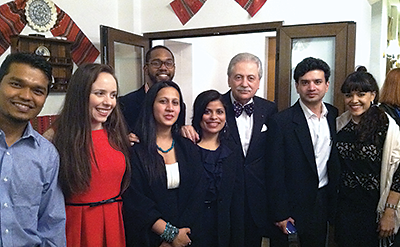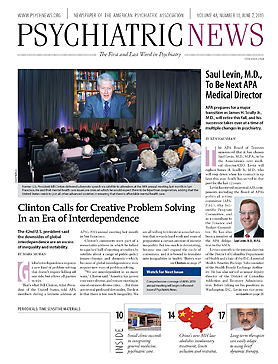In early April, the World Psychiatric Association (WPA) held its Regional Congress for Southeast Europe and Eurasia in Bucharest, Romania, centered on the theme “The Integration of Primary Care, Mental Health and Public Health: The Catalytic Role of Information and Communication Technology.” In attendance at the meeting were six psychiatry residents from programs in the Washington, D.C., area and one from Harvard University. The Washington-area residents were able to attend because they participate in the Washington Psychiatric Society’s (WPS) Career, Leadership and Mentorship program (CLM), initiated in 2008 by Eliot Sorel, M.D., who has been a mentor to the residents (Psychiatric News, April 19) and co-chair of the congress’s Scientific Committee.
Financial and logistical support for the residents; travel to the congress was provided by their psychiatry departments, according to Veronica Slootsky, M.D.; Milangel Concepcion, M.D., M.P.H.; and Mona Thapa, M.D., who discussed the event with Psychiatric News.
The congress was held in the Palace of the Parliament in Bucharest, which claims to be the largest civilian building in the world.
To prepare for the congress, Slootsky, Concepcion, and Thapa worked together to develop a workshop presentation titled “Global Childhood PTSD in Israel and Latin America.” They reported that the audience of international colleagues was enthusiastic about the presentation and that several noted that they were surprised to learn about the significant burden of ongoing traumatic experiences that places children at risk for posttraumatic stress disorder, depression, and anxiety disorders in disparate locations around the world.
The residents all said that that being able to give a presentation at the international psychiatry congress was an incredible opportunity to explore a topic of that is in focus around the world and is the subject of extensive academic discourse.
Additionally, the residents spoke about their experiences as psychiatry trainees who treat patients who have complex medical problems in addition to their mental illness. They also said that they discussed “different forms of mental health and primary care integration, with a focus on cost-effectiveness achieved through the integration of primary care, mental health, and public health.”
Other residents from the United States gave presentations on psychiatry in Nepal, Pakistan, and India; travel psychiatric medicine; the psychiatry of terrorism; and integrated mental health and primary care in HIV populations.
Slootsky, Concepcion, and Thapa said that as a result of their discussions with APA leaders who attended the congress, including Annelle Primm, M.D., APA deputy medical director and director of the Office of Minority and National Affairs, “members of our district branch’s CLM program plan to initiate an APA Global Psychiatry and Mental Health Caucus to stimulate collaboration among psychiatrists worldwide who have an interest in this field. The goal of the caucus will be to encourage young psychiatrists interested in global mental health issues to network with their colleagues who have similar interests and to foster dialogue with psychiatrists in other countries.”
“Our participation in the WPA 2013 Bucharest Congress was an incredible opportunity that will undoubtedly affect the rest of our careers,” they added. They emphasized that they “encourage other residents to seek out experiences such as the international congress in Bucharest, as the potential yield in professional and personal growth is monumental.” ■

